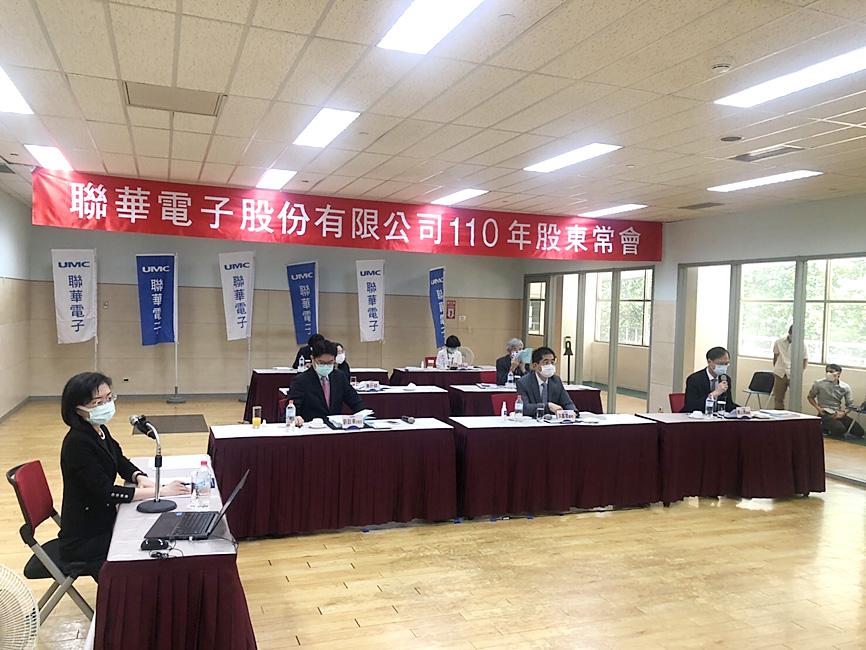The global semiconductor shortage is expected to last until 2023 as the COVID-19 pandemic boosts demand for chips for automobiles and smart home devices, United Microelectronics Corp (UMC, 聯電) copresident Chien Shan-chieh (簡山傑) said yesterday.
Speaking at the company’s annual general meeting in Hsinchu, Chien said that while the COVID-19 pandemic has had an adverse impact on the global economy, digital transformation has accelerated growth in the semiconductor industry.
Chip supply would fall short of demand and only worsen in the short term, with a shortage of 8-inch and 12-inch wafers set to be the most severe, Chien said.

Photo: Grace Hung, Taipei Times
As demand continues to soar, the global chip shortage is likely to last beyond next year until 2023, he said.
To solve the problem, the key is to increase capacity, Chien said, but added that even with chipmakers investing in fabs to expand capacity, it would take until 2023 for more chips to be produced.
UMC’s revenue grew 26 percent in US dollar terms last year, while its operating income surged to NT$22.01 billion (US$786.27 million), reflecting solid utilization rates across both 8-inch and 12-inch facilities, and optimization of the company’s blended product mix, he said.
Of particular note has been the company’s enhanced 12-inch product mix, which is primarily a result of the substantial pickup in the 28-nanometer wafer business, as well as the successful integration of 12-inch operations at its Japanese subsidiary United Semiconductor Japan Co, he added.
Shareholders of UMC, the world’s third-largest contract chipmaker, yesterday during the online meeting approved a plan to distribute a NT$1.6 cash dividend.
The company last year posted consolidated revenue of NT$176.82 billion, or earnings per share of NT$2.42, up 19.3 percent year-on-year.

‘SWASTICAR’: Tesla CEO Elon Musk’s close association with Donald Trump has prompted opponents to brand him a ‘Nazi’ and resulted in a dramatic drop in sales Demonstrators descended on Tesla Inc dealerships across the US, and in Europe and Canada on Saturday to protest company chief Elon Musk, who has amassed extraordinary power as a top adviser to US President Donald Trump. Waving signs with messages such as “Musk is stealing our money” and “Reclaim our country,” the protests largely took place peacefully following fiery episodes of vandalism on Tesla vehicles, dealerships and other facilities in recent weeks that US officials have denounced as terrorism. Hundreds rallied on Saturday outside the Tesla dealership in Manhattan. Some blasted Musk, the world’s richest man, while others demanded the shuttering of his

Taiwan’s official purchasing managers’ index (PMI) last month rose 0.2 percentage points to 54.2, in a second consecutive month of expansion, thanks to front-loading demand intended to avoid potential US tariff hikes, the Chung-Hua Institution for Economic Research (CIER, 中華經濟研究院) said yesterday. While short-term demand appeared robust, uncertainties rose due to US President Donald Trump’s unpredictable trade policy, CIER president Lien Hsien-ming (連賢明) told a news conference in Taipei. Taiwan’s economy this year would be characterized by high-level fluctuations and the volatility would be wilder than most expect, Lien said Demand for electronics, particularly semiconductors, continues to benefit from US technology giants’ effort

ADVERSARIES: The new list includes 11 entities in China and one in Taiwan, which is a local branch of Chinese cloud computing firm Inspur Group The US added dozens of entities to a trade blacklist on Tuesday, the US Department of Commerce said, in part to disrupt Beijing’s artificial intelligence (AI) and advanced computing capabilities. The action affects 80 entities from countries including China, the United Arab Emirates and Iran, with the commerce department citing their “activities contrary to US national security and foreign policy.” Those added to the “entity list” are restricted from obtaining US items and technologies without government authorization. “We will not allow adversaries to exploit American technology to bolster their own militaries and threaten American lives,” US Secretary of Commerce Howard Lutnick said. The entities

Minister of Finance Chuang Tsui-yun (莊翠雲) yesterday told lawmakers that she “would not speculate,” but a “response plan” has been prepared in case Taiwan is targeted by US President Donald Trump’s reciprocal tariffs, which are to be announced on Wednesday next week. The Trump administration, including US Secretary of the Treasury Scott Bessent, has said that much of the proposed reciprocal tariffs would focus on the 15 countries that have the highest trade surpluses with the US. Bessent has referred to those countries as the “dirty 15,” but has not named them. Last year, Taiwan’s US$73.9 billion trade surplus with the US